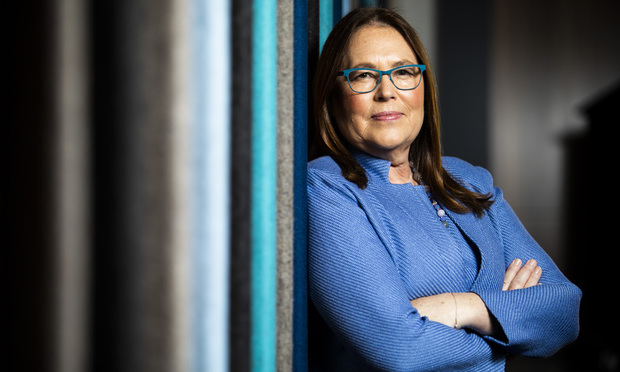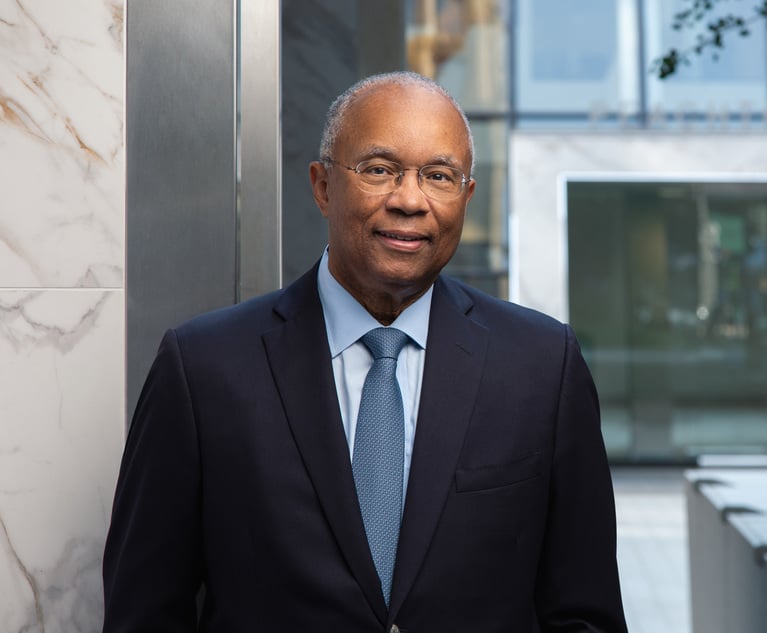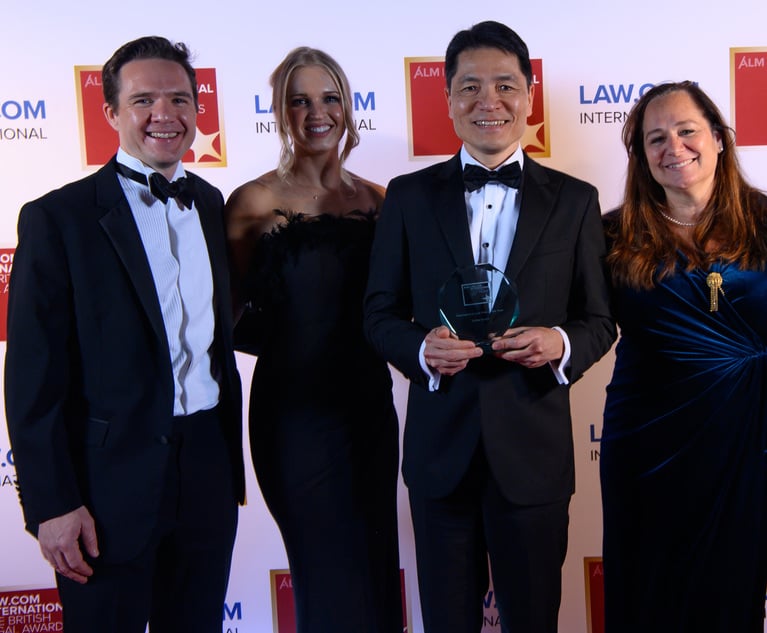Morgan Lewis Chair Credits Diversified Practice, Good Fortune for Forestalling Cuts
Far from being cut off from clients, "We're talking to clients constantly. All day every day. It's a different kind of business development," says Jami Wintz McKeon.
May 26, 2020 at 06:50 PM
8 minute read
 Jami Wintz McKeon, chair of Morgan, Lewis & Bockius. Photo: Diego M. Radzinschi/ALM
Jami Wintz McKeon, chair of Morgan, Lewis & Bockius. Photo: Diego M. Radzinschi/ALM
The website for Morgan, Lewis & Bockius added a new branding element partway through the coronavirus crisis. Chair Jami Wintz McKeon says that the resources gathered under the new tagline—"Now. Normal. Next"—have garnered 500,000 hits as clients have embraced the firm's continued adherence to a "relationship" model. Unlike many peers, the firm has refused to abandon key practices such as labor and employment in pursuit of areas offering greater profitability. That wide focus, according to McKeon, has helped Morgan Lewis avoid any cuts to compensation or staffing, even as others in the Am Law 25 have had to make hard choices to preserve cash.
In fact, the firm quietly delivered raises to global business services staff in April. And on Tuesday it announced the hire in London of a four-lawyer private investment funds team formerly with Morrison & Foerster.
McKeon spoke with ALM recently about changes to her routine and those of her co-workers, as well as lessons the firm can take once conventional business life returns anew.
It's been two and a half months since we all started working from home. What lessons have you learned?
It's been a little bit longer than that because of our offices in Asia. As a whole, our firm has been out for two and a half months, but really if you look at it it's been more like four months for us.
We're probably the first firm of our size that adopted a formal remote working program for our associates. So we've had a couple of years where we've been allowing our associates to work from home two days a week with the equipment that we supply. We weren't really strangers to that, either technologically or culturally. We have realized that people can be incredibly productive when they work remotely.
When you get into a crisis, it's not a really good time to try to start having to instill cultural values in people that aren't already there. You kind of revert to what comes most comfortably and naturally to you. So if you're in an organization where collaboration, empathy, team focus, working across geographies, practices, industries is kind of second nature, you're really fortunate because you don't have to relearn that or you don't have to teach that to people. All those things enabled us to pivot really quickly to a remote working environment very effectively.
What impact do you expect this moment to have on business development when you can't do the usual things that you do to maintain contact with clients?
I think people would have said that business development would be harder in this time, when you're not seeing clients face to face and you're not attending events. But I think the reverse has really proved true for us. We very quickly and very early on developed teams of people who were focused on providing help and resources to our clients.
We've always been strongly a proponent of having much broader and deeper substantive areas of practice than a lot of firms our size. We didn't skinny down and eliminate this area or that area, or say, "We're only going to focus on the most profitable this or we're only chasing this kind of work in that." Our goal has been to be almost full service to all of our global corporate clients.
So what's happened in this period of time where our clients are all confronting a completely new world that really nobody plans for—where they have problems that are regulatory that involve expertise of our FDA team, or problems that are 'How do I get a PPP loan," or the myriad issues that employers are engaged in—we have 500 lawyers engaged in these teams, and what we're finding is we're talking to clients constantly. All day every day. It's a different kind of business development.
Are there lessons that can be taken from this mode of retaining contact when we get back to the point where you can hop on a plane and go and meet in person with clients that way?
I think people are going to be much quicker to jump on a video conference or Zoom or WebEx just to check in with people. People are now in the habit of doing this face-to-face remotely. It's taken the place of IM and text and short phone calls or emails. People are now just in that rhythm of seeing somebody's face.
People are craving seeing each other; I think people will be excited to do that again. But they're also realizing you don't need to wait six months to have a face-to-face conversation, and you don't have to fly across the country to get somebody's attention.
I haven't heard about any cuts to compensation or personnel of the firm, and there has even been a report of raises to global services staff. Can you confirm that you haven't made any cuts? If not, how have you managed to avoid doing so?
My parents always used to say that there's a combination of good luck and good management in almost everything, and I think that's probably true. We are a thoughtfully and carefully managed firm. We pivoted to a significant remote work capability two years ago, and we've had a couple of years to test that out. We have continually looked at workforce restructuring so that we've been smart about the talent that we have and making sure that we are aligned with what our clients need. We have had a very significant business continuity and disaster recovery planning. We're fiscally responsible. These things have all put us in really good stead.
In addition, on the luck side, we have the fortuity of the Sept. 30 fiscal year, so when this all hit, we were halfway through our fiscal year, and it was a very strong fiscal year. We weren't in a position where we [needed to delay distributions], and we also don't pay out more than we make. We also don't have long term debt, we do not intend to borrow, and we have strong capital.
We have partners who look at the world very responsibly. We don't go out and buy practices, we don't over invest in areas where we don't already have strong client relationships. We've been very careful, even with our growth, to bring on really strong teams who have a high level of accessibility to our clients.
You ordinarily have a pretty peripatetic schedule. Are you enjoying having this time at home, or are you eager to get back out on the road?
You are right. I ordinarily do have a pretty peripatetic schedule. And the funny thing is, I'm home now, with my daughter and son-in-law, my brother-in-law, a son in college, a daughter in college, and my husband, all of us working. We're spread out in 50 different places, trying to work our usual schedules and covering everything around the globe. And it feels pretty peripatetic just being here. I have to say, there is a positive about not commuting, not being in a different city every day, not having to make choices about events to miss, because A, there is no travel and B, there are no events.
What I'm finding is that the conflict that I've had for the full lives of my children—how can I be in three different places at once, and how quickly can I get home from Japan in order to make someone's lacrosse game—that's what's missing from my schedule.
I am cooking a lot. I like to cook, and my family likes to eat. So I'm replacing some of my schedule with trying to be creative in feeding seven adults every night. I've got to tell you, I'm grateful for this time. The only thing that would be even better is if my son and daughter-in-law and their two babies with a third on the way were all living in the same house, too.
This interview has been edited for length and clarity.
Read More
Cooley Resists Cuts as CEO Peers Into a Post-Pandemic Future
Facing Boom in #MeToo Work, Morgan Lewis Snags Sidley Employment Leader
Morgan Lewis U.K. Profits Soar Over 70% Amid London Partnership Changes
This content has been archived. It is available through our partners, LexisNexis® and Bloomberg Law.
To view this content, please continue to their sites.
Not a Lexis Subscriber?
Subscribe Now
Not a Bloomberg Law Subscriber?
Subscribe Now
NOT FOR REPRINT
© 2025 ALM Global, LLC, All Rights Reserved. Request academic re-use from www.copyright.com. All other uses, submit a request to [email protected]. For more information visit Asset & Logo Licensing.
You Might Like
View All
Zuckerman Spaeder Gets Ready to Move Offices in DC, Deploy AI Tools in 2025
5 minute read
Ex-Deputy AG Trusts U.S. Legal System To Pull Country Through Times of Duress
7 minute read
Legal Recruiter Amy Savage Joins Garrison as Lateral Gov't Moves Stay Busy
6 minute readLaw Firms Mentioned
Trending Stories
- 1California Lawmakers Reach $50M Deal to Fund Legal Fights Against Trump
- 2Supreme Court Wrestles With Disabled Ex-Firefighter's Discrimination Case
- 3NJ Firm Narrowly Avoids Case Dismissal Over Lengthy Complaint Filed in Fed Court
- 4Arbitrators Under Fire for Allegedly Forcing Workers to 'Stay or Pay' Employers
- 5Plaintiff Narrowly Avoids Dismissal Over Lengthy Complaint Filed in Federal Court
Who Got The Work
Michael G. Bongiorno, Andrew Scott Dulberg and Elizabeth E. Driscoll from Wilmer Cutler Pickering Hale and Dorr have stepped in to represent Symbotic Inc., an A.I.-enabled technology platform that focuses on increasing supply chain efficiency, and other defendants in a pending shareholder derivative lawsuit. The case, filed Oct. 2 in Massachusetts District Court by the Brown Law Firm on behalf of Stephen Austen, accuses certain officers and directors of misleading investors in regard to Symbotic's potential for margin growth by failing to disclose that the company was not equipped to timely deploy its systems or manage expenses through project delays. The case, assigned to U.S. District Judge Nathaniel M. Gorton, is 1:24-cv-12522, Austen v. Cohen et al.
Who Got The Work
Edmund Polubinski and Marie Killmond of Davis Polk & Wardwell have entered appearances for data platform software development company MongoDB and other defendants in a pending shareholder derivative lawsuit. The action, filed Oct. 7 in New York Southern District Court by the Brown Law Firm, accuses the company's directors and/or officers of falsely expressing confidence in the company’s restructuring of its sales incentive plan and downplaying the severity of decreases in its upfront commitments. The case is 1:24-cv-07594, Roy v. Ittycheria et al.
Who Got The Work
Amy O. Bruchs and Kurt F. Ellison of Michael Best & Friedrich have entered appearances for Epic Systems Corp. in a pending employment discrimination lawsuit. The suit was filed Sept. 7 in Wisconsin Western District Court by Levine Eisberner LLC and Siri & Glimstad on behalf of a project manager who claims that he was wrongfully terminated after applying for a religious exemption to the defendant's COVID-19 vaccine mandate. The case, assigned to U.S. Magistrate Judge Anita Marie Boor, is 3:24-cv-00630, Secker, Nathan v. Epic Systems Corporation.
Who Got The Work
David X. Sullivan, Thomas J. Finn and Gregory A. Hall from McCarter & English have entered appearances for Sunrun Installation Services in a pending civil rights lawsuit. The complaint was filed Sept. 4 in Connecticut District Court by attorney Robert M. Berke on behalf of former employee George Edward Steins, who was arrested and charged with employing an unregistered home improvement salesperson. The complaint alleges that had Sunrun informed the Connecticut Department of Consumer Protection that the plaintiff's employment had ended in 2017 and that he no longer held Sunrun's home improvement contractor license, he would not have been hit with charges, which were dismissed in May 2024. The case, assigned to U.S. District Judge Jeffrey A. Meyer, is 3:24-cv-01423, Steins v. Sunrun, Inc. et al.
Who Got The Work
Greenberg Traurig shareholder Joshua L. Raskin has entered an appearance for boohoo.com UK Ltd. in a pending patent infringement lawsuit. The suit, filed Sept. 3 in Texas Eastern District Court by Rozier Hardt McDonough on behalf of Alto Dynamics, asserts five patents related to an online shopping platform. The case, assigned to U.S. District Judge Rodney Gilstrap, is 2:24-cv-00719, Alto Dynamics, LLC v. boohoo.com UK Limited.
Featured Firms
Law Offices of Gary Martin Hays & Associates, P.C.
(470) 294-1674
Law Offices of Mark E. Salomone
(857) 444-6468
Smith & Hassler
(713) 739-1250











